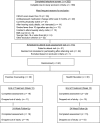Feasibility of an exercise counseling intervention for depressed women smokers
- PMID: 19541948
- PMCID: PMC2711987
- DOI: 10.1093/ntr/ntp101
Feasibility of an exercise counseling intervention for depressed women smokers
Abstract
Introduction: Depressive symptoms negatively impact smoking abstinence. However, few interventions have been targeted to smokers with current depression. Exercise improves mood and may benefit depressed smokers. This pilot study investigated the feasibility of an exercise intervention for depressed female smokers (Center for Epidemiological Studies Depression Scale [CES-D] score > or =16).
Methods: Participants (M = 41 years, 98% White) were randomized to 10 weeks of individually delivered exercise counseling (n = 30) or a health education contact control condition (n = 30). All participants received nicotine patch therapy and behavioral counseling for smoking cessation.
Results: The intervention was feasible as indicated by ability to recruit participants, exercise counseling session attendance (M = 7.6 of 10 sessions attended), and significant increase in exercise frequency and stage of change from baseline to end of treatment (EOT) (Week 10). Participant attrition rate was 35% by Week 10 but did not differ significantly between groups. Smoking abstinence rates at Week 10, using intention-to-treat analysis, were 17% for exercise counseling participants and 23% for health education participants (p = .75).
Discussion: An exercise counseling intervention was found to be feasible for depressed women smokers. More intensive intervention may be needed to increase smoking abstinence rates, and methods should be refined to reduce participant burden and attrition.
Figures
References
-
- Abrams DB, Monti PM, Pinto B, Elder JP, Brown RA, Jacobus SI. Psychosocial stress and coping in smokers who relapse or quit. Health Psychology. 1987;6:289–303. - PubMed
-
- Bagby RM, Ryder AG, Schuller DR, Marshall MB. The Hamilton Depression Rating Scale: Has the gold standard become a lead weight? American Journal of Psychiatry. 2004;161:2163–2177. Review. - PubMed
-
- Bandura A. Self-efficacy: Toward a unifying theory of behavioral change. Psychological Review. 1977;84:191–215. - PubMed
-
- Bandura A. Exercise of personal agency through the self-efficacy mechanism. In: Schwarzer R, editor. Self-efficacy: Thought control of action. Washington, DC: Hemisphere Publishing Corporation; 1992. pp. 3–38.
-
- Bellg AJ, Borrelli B, Resnick B, Hecht J, Minicucci DS, Ory M, et al. Treatment Fidelity Workgroup of the NIH Behavior Change Consortium. Enhancing treatment fidelity in health behavior change studies: Best practices and recommendations from the NIH Behavior Change Consortium. Health Psychology. 2004;23:443–451. - PubMed


